Zi'ou Zheng
Exploring the Role of Reasoning Structures for Constructing Proofs in Multi-Step Natural Language Reasoning with Large Language Models
Oct 11, 2024



Abstract:When performing complex multi-step reasoning tasks, the ability of Large Language Models (LLMs) to derive structured intermediate proof steps is important for ensuring that the models truly perform the desired reasoning and for improving models' explainability. This paper is centred around a focused study: whether the current state-of-the-art generalist LLMs can leverage the structures in a few examples to better construct the proof structures with \textit{in-context learning}. Our study specifically focuses on structure-aware demonstration and structure-aware pruning. We demonstrate that they both help improve performance. A detailed analysis is provided to help understand the results.
NatLogAttack: A Framework for Attacking Natural Language Inference Models with Natural Logic
Jul 06, 2023



Abstract:Reasoning has been a central topic in artificial intelligence from the beginning. The recent progress made on distributed representation and neural networks continues to improve the state-of-the-art performance of natural language inference. However, it remains an open question whether the models perform real reasoning to reach their conclusions or rely on spurious correlations. Adversarial attacks have proven to be an important tool to help evaluate the Achilles' heel of the victim models. In this study, we explore the fundamental problem of developing attack models based on logic formalism. We propose NatLogAttack to perform systematic attacks centring around natural logic, a classical logic formalism that is traceable back to Aristotle's syllogism and has been closely developed for natural language inference. The proposed framework renders both label-preserving and label-flipping attacks. We show that compared to the existing attack models, NatLogAttack generates better adversarial examples with fewer visits to the victim models. The victim models are found to be more vulnerable under the label-flipping setting. NatLogAttack provides a tool to probe the existing and future NLI models' capacity from a key viewpoint and we hope more logic-based attacks will be further explored for understanding the desired property of reasoning.
Learning to Retrieve Entity-Aware Knowledge and Generate Responses with Copy Mechanism for Task-Oriented Dialogue Systems
Dec 22, 2020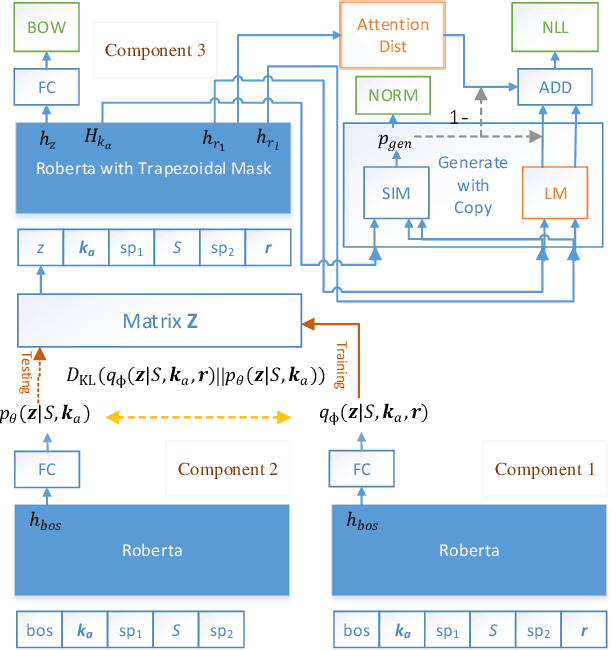
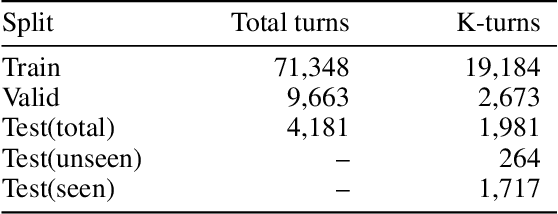
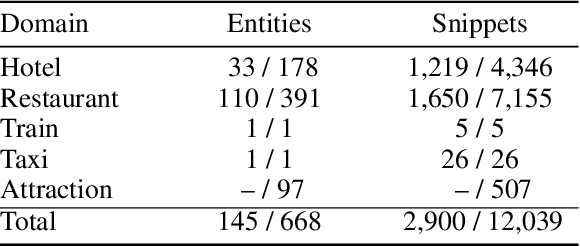

Abstract:Task-oriented conversational modeling with unstructured knowledge access, as track 1 of the 9th Dialogue System Technology Challenges (DSTC 9), requests to build a system to generate response given dialogue history and knowledge access. This challenge can be separated into three subtasks, (1) knowledge-seeking turn detection, (2) knowledge selection, and (3) knowledge-grounded response generation. We use pre-trained language models, ELECTRA and RoBERTa, as our base encoder for different subtasks. For subtask 1 and 2, the coarse-grained information like domain and entity are used to enhance knowledge usage. For subtask 3, we use a latent variable to encode dialog history and selected knowledge better and generate responses combined with copy mechanism. Meanwhile, some useful post-processing strategies are performed on the model's final output to make further knowledge usage in the generation task. As shown in released evaluation results, our proposed system ranks second under objective metrics and ranks fourth under human metrics.
Exploring End-to-End Differentiable Natural Logic Modeling
Nov 08, 2020
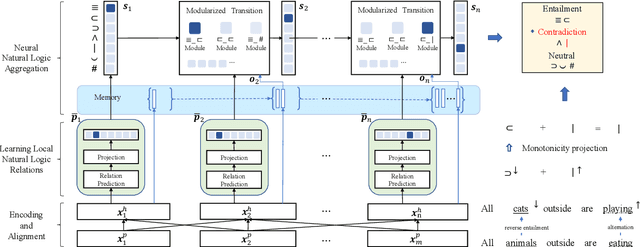
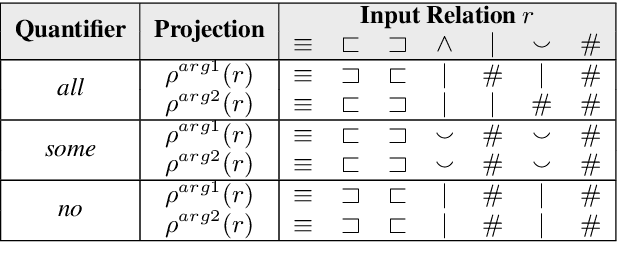

Abstract:We explore end-to-end trained differentiable models that integrate natural logic with neural networks, aiming to keep the backbone of natural language reasoning based on the natural logic formalism while introducing subsymbolic vector representations and neural components. The proposed model adapts module networks to model natural logic operations, which is enhanced with a memory component to model contextual information. Experiments show that the proposed framework can effectively model monotonicity-based reasoning, compared to the baseline neural network models without built-in inductive bias for monotonicity-based reasoning. Our proposed model shows to be robust when transferred from upward to downward inference. We perform further analyses on the performance of the proposed model on aggregation, showing the effectiveness of the proposed subcomponents on helping achieve better intermediate aggregation performance.
* 10 pages
 Add to Chrome
Add to Chrome Add to Firefox
Add to Firefox Add to Edge
Add to Edge